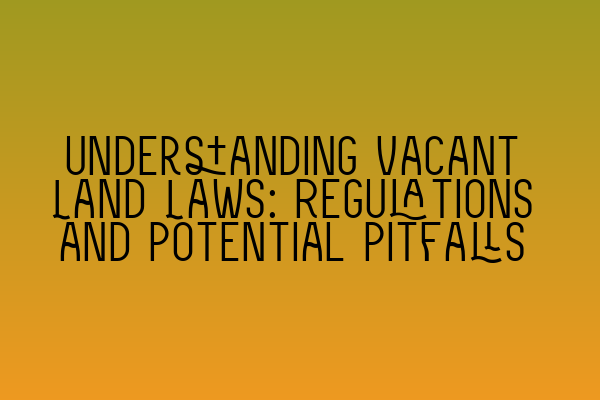Understanding Vacant Land Laws: Regulations and Potential Pitfalls
When it comes to dealing with vacant land, understanding the regulations and potential pitfalls is crucial for anyone involved in property law. Whether you are a property owner, developer, or investor, having a firm grasp of the laws governing vacant land can make all the difference in ensuring a smooth and successful transaction. In this blog post, we will explore the key aspects of vacant land laws and provide valuable insights to help you navigate this complex field.
Zoning Regulations and Land Use
One of the first and most important factors to consider when dealing with vacant land is zoning regulations. Zoning laws define the types of activities that are allowed on a particular parcel of land. They are put in place by local authorities to ensure that land is used in a way that is compatible with the surrounding area and in accordance with the community’s plan for development.
Zoning regulations can dictate the maximum building height, the type of structures allowed, the density of development, and even the permitted activities on the land. It is essential to thoroughly research and understand the zoning regulations for a specific parcel of land before moving forward with any plans or transactions. Failure to comply with these regulations can result in severe penalties and legal complications.
Environmental Considerations
When dealing with vacant land, it is important to be aware of any environmental considerations that may come into play. Environmental regulations can impact the use and development of land, especially when it comes to parcels located near sensitive areas such as wetlands, bodies of water, or protected habitats.
Environmental impact assessments may be required before any development can take place. These assessments, typically conducted by environmental experts, evaluate the potential impact of development on the surrounding ecosystem. Failure to address environmental concerns can lead to costly legal battles, fines, and delays in the development process.
Access and Easements
Another crucial aspect of vacant land laws is access and easements. Access refers to the ability to enter and exit a property, while easements grant specific rights to others, such as the right to cross the land or use a portion of it for a particular purpose.
When dealing with vacant land, it is essential to verify the existence and legality of access rights and easements. This can involve reviewing deeds and historical records to determine if there are any existing easements or rights of way. Failing to address access and easement issues can hamper development plans or lead to disputes with neighboring property owners.
Title and Ownership
Understanding the title and ownership of vacant land is crucial to ensuring a smooth transaction. Before proceeding with any purchase or transaction, it is important to conduct a thorough title search to identify any potential title defects or encumbrances. These can include disputes over ownership, outstanding liens, easements, or other legal claims that may affect the ability to develop or use the land.
Working with a qualified solicitor who specializes in property law can help ensure that the title is clear and that you are fully aware of any risks associated with the land. Additionally, obtaining title insurance can provide an extra layer of protection against unexpected title issues that may arise in the future.
Conclusion
Dealing with vacant land can be a complex process, but understanding the regulations and potential pitfalls is vital to a successful transaction. By familiarizing yourself with zoning regulations, environmental considerations, access and easement rights, and the title and ownership of the land, you can avoid costly legal disputes, delays, and setbacks.
At SQE Property Law & Land Law, we specialize in providing expert legal advice and solutions for all types of property transactions, including vacant land. Our team of highly skilled solicitors is well-versed in the intricacies of property law and can guide you through every step of the process, ensuring a smooth and hassle-free transaction.
To learn more about our services and how we can help you navigate the world of property law, please visit our website today. And don’t forget to check out our related articles for more information on SQE certification and exam preparation:
– SQE 1 Practice Exam Questions
– SQE 1 Practice Mocks FLK1 FLK2
– SQE 2 Preparation Courses
– SQE 1 Preparation Courses
– SRA SQE Exam Dates
Contact us today to schedule a consultation and let us help you with all your vacant land legal needs. Your success is our priority.
